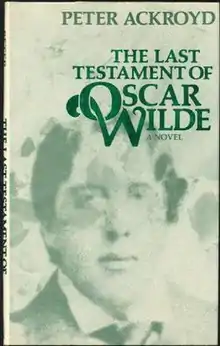 First edition cover | |
| Author | Peter Ackroyd |
|---|---|
| Country | United Kingdom |
| Language | English |
| Publisher | Hamish Hamilton |
Publication date | April 1983 |
| Media type | Print (Hardback & Paperback) |
| ISBN | 978-0-241-10964-9 |
The Last Testament of Oscar Wilde is a 1983 novel by Peter Ackroyd. It won the Somerset Maugham Award[1] in 1984.
Plot summary
The novel is written in the form of a diary which Oscar Wilde was writing in Paris in 1900, up to his death. The diary itself is completely fictional, as is the detail contained, although the events and most of the characters (such as the characters of Lord Alfred Douglas, Robert Ross and the Earl of Rosebery and his incarceration, at Pentonville, later Reading) are real. In this diary he looks back at his life, writing, and ruin through trial and gaol. Included are fairy tales much like those Wilde wrote, although again these are wholly Ackroyd's invention. The last pages are written in the character of Maurice, Wilde's valet.
References
- ↑ O'Mahony, John (2 July 2004). "Profile: Peter Ackroyd". The Guardian.
External links
- Ukko Hänninen: Rewriting Literary History: Peter Ackroyd and Intertextuality Archived 10 September 2019 at the Wayback Machine
This article is issued from Wikipedia. The text is licensed under Creative Commons - Attribution - Sharealike. Additional terms may apply for the media files.